Dear Football: What playing the sport, and representing BYU, has meant to us
Editor’s note: BYU defensive back, and Daily Universe sports writer, Caleb Christensen interviewed some of his teammates about their experiences in the football program and he reflected on his own career as a Cougar.
Playing the game of football is something special. It is something that transcends generations and connects families.
Statistically, only a select few get to play football past the high school level. According to the NCAA on the estimated probability of competing in college athletics, just over 7% of high school athletes will continue to play across Division I, II, and III.
The percentage of these players that will go on to play professionally is a staggeringly low 1.6% per the NFL’s College Advisory Committee.
All of this is to say that nobody plays the game forever.
For some athletes, their relationship with their sport has been forming for more than a decade. This is no short-term commitment; in some cases, athletes claim they are “married to the game” due to the personal relationship they have cultivated.
Despite this long, personal relationship there can be a lack of closure. Most often an athlete will play their last game and be forced to move on.
But, what if you could say goodbye? What if you could have a real conversation with the sport you have dedicated years of your life to?
I sat down with four of BYU football’s seniors and posed the question, if the game of football was a person, what would you say to it at the conclusion of your career?
Here is what they had to say:
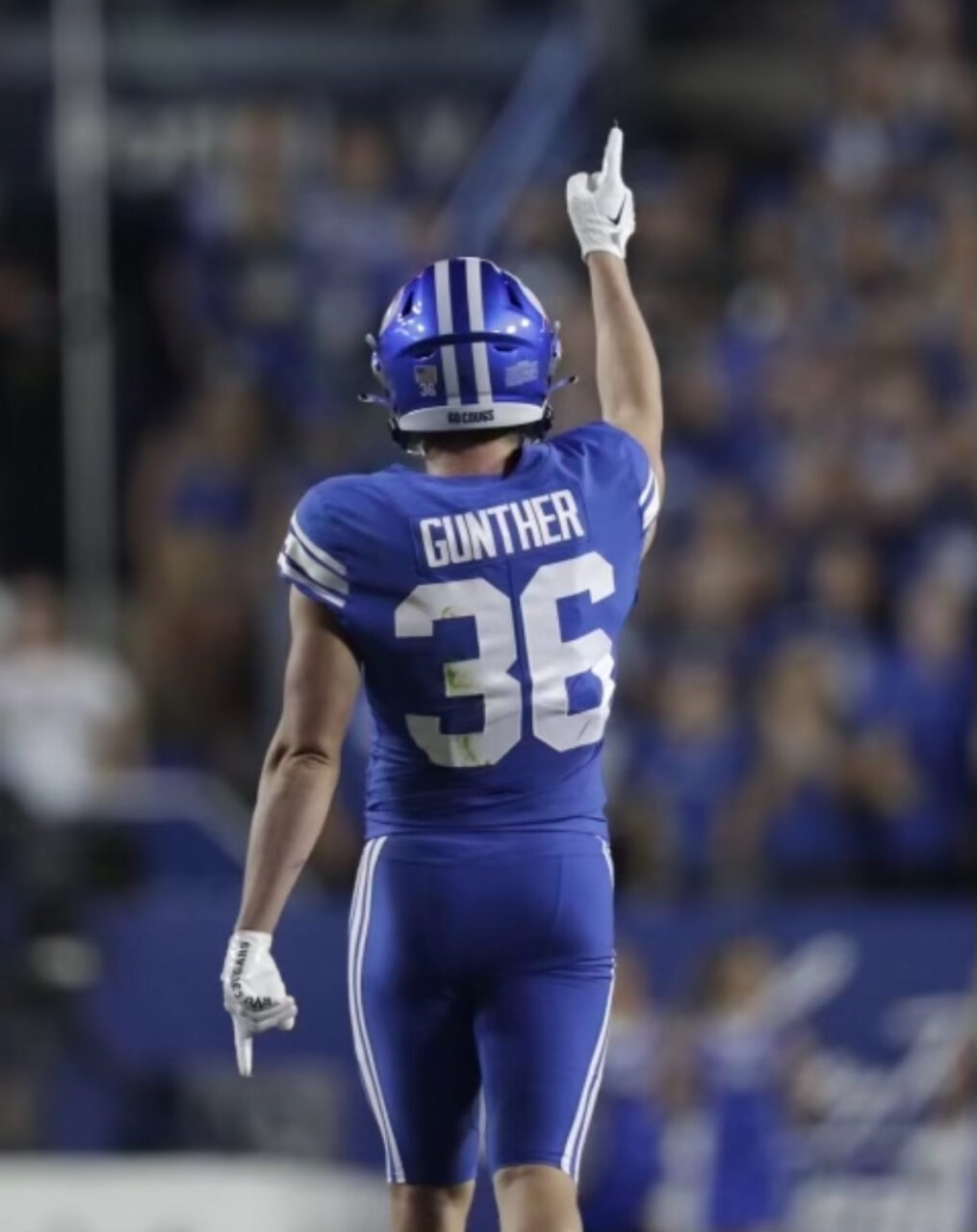
Senior wide receiver Talmage Gunther was all but done with football after the 2022 season. Gunther had been working tirelessly for years to climb the depth chart and had yet to find any sort of success.
“A year ago we had just won the New Mexico Bowl, but my relationship with football was not the greatest. I was considering being done, but it just didn’t feel right,” he said. “I didn’t want to go out that way, feeling bitter and feeling resent towards coaches and the program.”
The birth of his second son would end up being one of the deciding factors in staying for his senior year.
“I decided to come back, and Briggs was born early in January and it made me want to play one more and leave him something to remember, and end on better terms with the game of football,” he said.
Gunther said he has always been overly obedient, wanting to impress coaches and earn his merit, specifically in the weight room. However, this season, he took a different approach.
“The things I had been told were keeping me from playing were speed and winning one-on-ones,” he added. ”I didn’t do any extra work in the weight room. Any extra work I did was to work on getting faster and running routes.”
This new strategy started to pay off; Gunther said his body was better than ever.
“I felt like my body was recovering faster and my body wasn’t always hurting,” he said, “I didn’t have to push through this soreness from the weight room, I was able to just go out and practice.”
This was his best offseason performance yet.
“Due to injury and playing well I was rockin’ with the ones with a lot of spring ball,” he said.
Gunther felt his progress transfer over to fall camp. But the acquisition of a few transfer players kept him from climbing the ranks.
This was something that in previous years would have sent Gunther through a spiral of emotions, but this year he had a different kind of focus.
“I knew we had transfers coming and they would get inserted into the lineup ahead of me, but I came with the attitude that I was just going to do my thing and whatever happens to me happens,” he said.
He had realized and risen to his potential, and if his coaches couldn’t realize it, he knew he had given his all.
“In the past, I tried to have that mindset but my resolve wasn’t as strong,” he added. “This year my resolve was, “No matter what I’m going to go out and have fun.”
Gunther recalled not letting things like dropped passes or missed blocks get under his skin.
“In the past, I would miss a pass and be really discouraged,” he said. “It’s not like I didn’t care but it was a lot easier to move on from. Dwelling on it had never helped me before.”
By the start of the season, Gunther’s work had finally paid off.
“Going into the season I got put on scholarship right before the first game and that was huge,” he said.
He felt he had finally arrived, his moment had come and he was ready. Through the first two games he waited, and waited, and waited but his moment never came.
“I went numb and even when I got on the field for special teams I felt like a ghost. I felt dead,” he added. “I went up from the highest of highs, the coaches believed in me, and that got crushed.”
After those first couple of games, Gunther remembered the resolve he had set upon himself. Throughout the season, he finally gained a portion of the playtime he was looking for.
“It’s not like I was playing a ton, but I was playing receiver more than I ever had,” he said. “Through the whole season in practice I was performing well and making plays and having fun.”
With the season ending abruptly, Gunther had to come to terms with his career ending faster than he had anticipated.
“It’s definitely hard to let go of, but I think it was the right thing and I feel peace about it,” he said.
Gunther had a career full of ups and downs but in the end, he feels grateful for everything the game has given him.
“A big thank you would be the first thing I’d say. Football like a lot of other relationships there’s give and take. I’ve given my all to football and it’s taken a lot from me but it’s given a lot more than it’s taken.
“Some of the things you can learn there that are hard to learn anywhere else,” he said. “Performing under pressure, and working with teammates that are different, putting your personal aspirations aside and working with the team, and showing up every day when you don’t want to.”
“I’ll always be thankful for those lessons and I’ll always be thankful for football for teaching those to me,” he said. “The memories of actually playing the game are amazing but the things that will last the longest are those relationships and those lessons.”
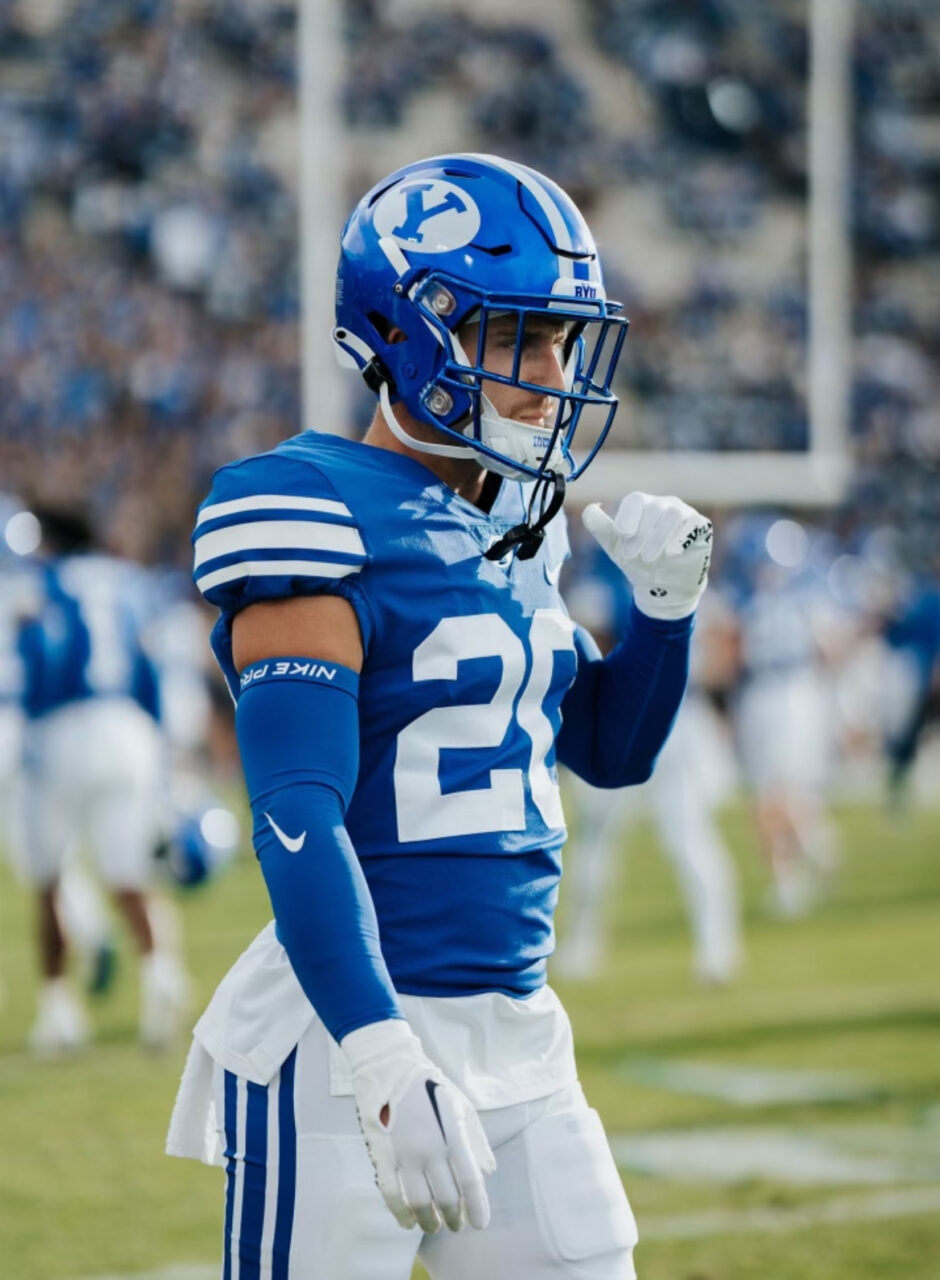
Senior defensive back Jake Boren had an unconventional career here at BYU.
“My journey has been a unique one,” Boren said.
Boren played at Highland High School in Salt Lake City. With no offers out of high school and a mission for The Church of Jesus Christ of Latter-Day Saints ahead, football was the last thing on his mind.
After returning home from his missionary services, he enrolled at BYU, having no intentions of continuing his athletic career.
“I didn’t really have any aspirations to play in college,” he added. “I just saw a flier in the hallway for walkon tryouts.”
Boren made the decision to test his luck and go out for the team. He made the initial cuts and was invited to stay for the season with the notion that he would need to try out again the following winter.
After going through that process a second time he landed a permanent spot on the roster as a wide receiver, later making the switch to defensive back.
“There have been a lot of ups and downs in my career,” Boren added. “There were times when I was playing a lot, started a couple of games, there were other items I was just on special teams.”
Boren has played football since he was in elementary school. Because of this, his relationship with the game has been curating for a very long time. Despite several setbacks, Boren was filled with gratitude for the game of football.
“I’d probably say thank you, I would want to thank football for everything that I’ve learned throughout my life,” he said. “Football and sports in general have taught me a lot about hard work, teamwork, and communication.”
Boren felt his time here at BYU was very educational.
“I’ve learned a lot about myself throughout my career, I’ve learned how to face adversity, how to deal with people I don’t always get along with, and handle confrontation,” he said.
Amidst all of the rigor of his training and practice schedule, Boren found strength in other areas as well.
“I’ve really had to learn how to deal with my mental state, I’ve become mentally strong,” he said.
According to Boren, the game has helped him with several off-the-field opportunities that would have been hard to come by otherwise.
“Football has opened a lot of doors for me. Being a BYU football player means a lot to a lot of people,” he said. “I got into the MBA program this fall and I feel like a big part of that was having BYU football on my resume.”
At the end of his career, Boren felt one of the things he wanted the most was the game’s opinion on his performance.
“I would ask them how I did, if I made the most out of my opportunities if I took advantage of everything that was given to me,” he said. “To get their perspective on how I did and what I did.”
Boren had a roller coaster of a career but came out of it with his head high.
“Had it not been for the times I was struggling to even make the roster I wouldn’t have appreciated the times when I was playing as much as I did,” he said. “At the end of the day, I don’t think I would have done anything differently.”
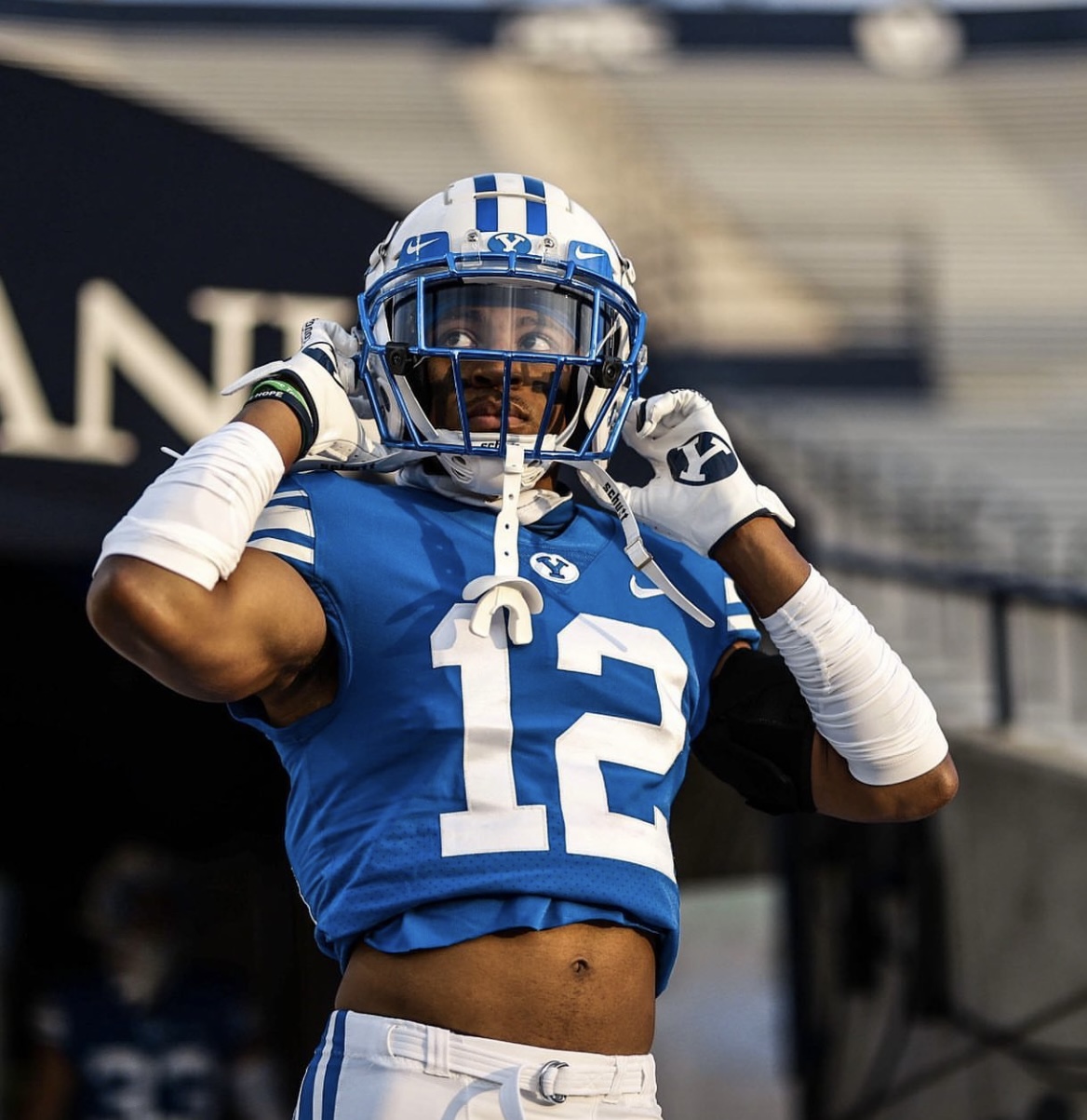
Senior safety Malik Moore had a successful season, although that success didn’t come where he was expecting it.
“I had fun; my career at BYU was nothing short of eventful,” he said.
Moore was a promising recruit out of Point Loma High School in San Diego, California. He arrived in 2018 and saw a little bit of playing time during his first season.
“2019 was when my playing time increased but I also got injured and missed half the season going into 2020,” he said.
Despite missing a season and a half, Moore came into the 2021 season ready to handle business.
“2021 came around and had the best year of my career, I was first time all-independent,” he said. “For the first year, I was actually starting.”
Moore had his 2022 season cut short following a fractured finger. The decision to play the rest of the season and declare for the 2023 NFL draft, or wait out the injury and come back for a fifth year, loomed overhead.
“2022 was the year I wanted to leave, but I got hurt again,” he said. “I could’ve still played but I was just being smart.”
Moore had yet to use his redshirt year and saw this as an opportunity to better himself and be a part of BYU’s inaugural Big 12 season. However, this decision did not initially treat him as well as he had hoped.
“This season didn’t go as planned,” he said.
Moore’s playing time was significantly cut after the coaching staff changes of the last off-season. He talked about the struggles of knowing he was a good player, but being comfortable not being good enough for his coach.
“That hurt me mentally, but being close with God and my family was a big outlet,” he said.
Although he was not receiving the playing time he was hoping for, he was able to devote more of his time to his off-the-field activities.
“This was the first year I had been questioning a lot,” he said.
Moore talked about how when you come in as a freshman and don’t play immediately, you don’t panic because you have a lot of time left. But, slowly as you move from an underclassman to an upperclassman, panic begins to set in.
“When you’re a senior it’s go time,” he said.
Although Moore did not meet his own expectations on the field, he felt he made the most of his opportunities this year.
“My off-the-field endeavors were better than my on-the-field endeavors could have ever been,” he said. “Now, I’m in contact with a lot of good people, and there are opportunities available to me now because I paid attention to the off-the-field things … Season didn’t go good but I think it was worth it.”
As Moore looks ahead at the opportunities that await him in life and football, these were his words to the game.
“Thank you for the opportunities, thank you for the people you’ve put in my life, thank you for the memories that I have with everyone,” he said. “Thank you for the degree, paid my way, if it wasn’t for football I wouldn’t have gone to college. Football was an outlet for me to get my life started.”
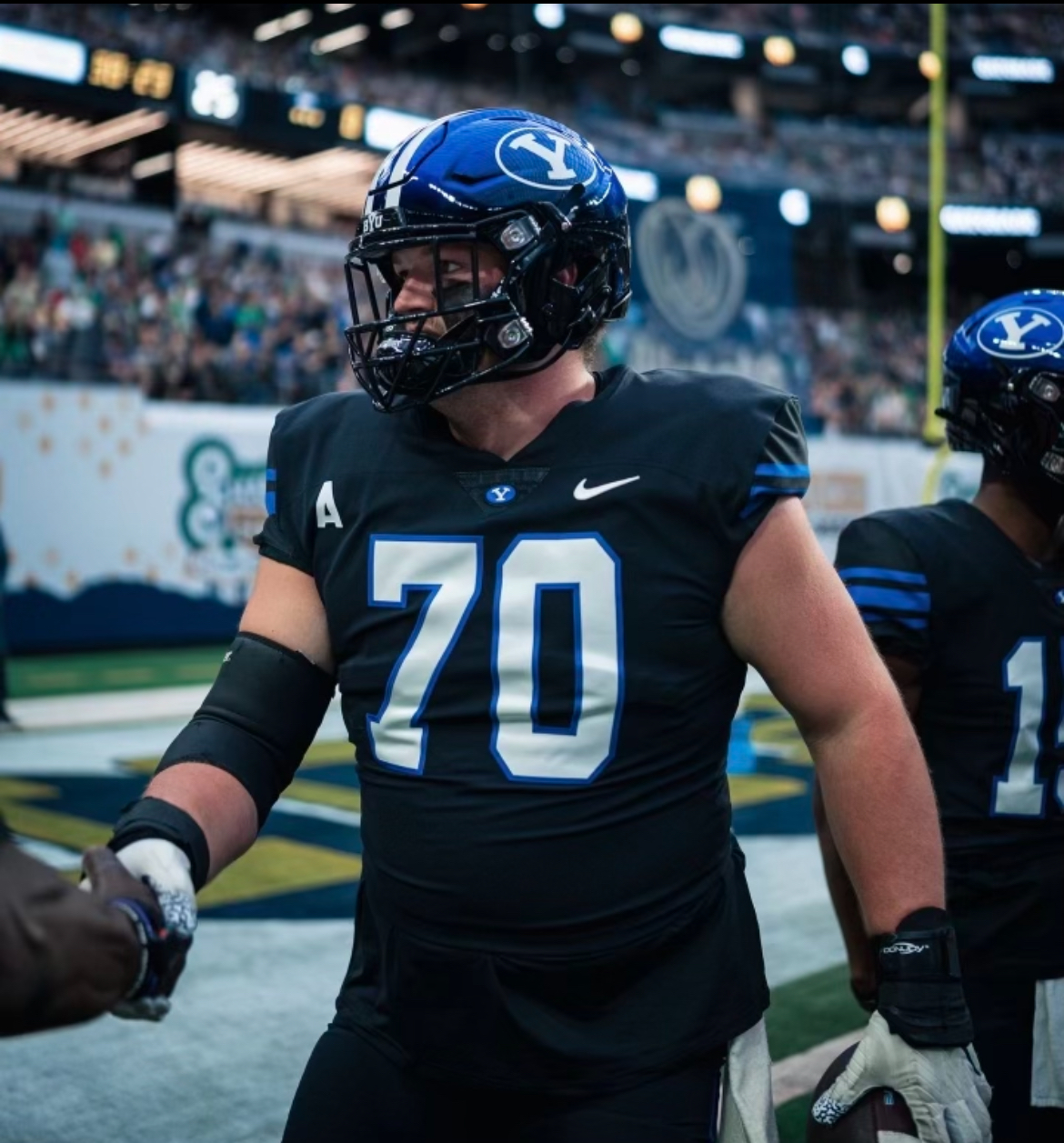
Senior offensive lineman Connor Pay came away from this season with a bad taste in his mouth.
“This season was a frustrating one, individually I felt I underperformed, but as a team, we underperformed as well,” he said.
Pay was pleased with how the team handled the last two games. Against two tough, ranked opponents, they held their own.
“We didn’t just throw in the towel those last two games, we came out and fought when it would have been really easy to quit,” he said.
The relationships that Pay has formed during his career, along with those of his teammates may have been the spark that kept the fight alive for the remaining two games.
“I think that is probably one of the big reasons why we were able to push through the adversity, we had those relationships and were able to band together,” he said. “As I look back at my career at BYU, the thing that sticks out the most is the relationships I’ve built with teammates. When I look at what is most valuable to me during my time at BYU, the people are definitely number one on that list without a doubt.”
These feelings of perseverance Pay had for the season mirror his feelings about his career here at BYU. Despite injuries, coaching troubles, and more Pay feels he always made the most of what he had.
“That’s kind of been my career here at BYU, ups, and downs but never quitting, never wavering, always pushing through adversity,” he said. “Over the last three seasons, I’ve had chances to leave. I’ve been offered a lot of money to go somewhere else, but I stayed and that’s something I’m proud of.”
The Pay family has a long relationship with the game of football. Pay’s father, Gary Pay also played offensive line for BYU and spent some time in the NFL.
“Football means a lot to our family, we are a football family through and through,” he said. “In a lot of ways we owe a lot of whatever we do in the future to the game, just because of the opportunities it has provided and the situations it has put my family in is invaluable.”
Pay has been bleeding BYU blood long before his arrival in 2020. Through the highs and lows of his career, “gratitude is the number one feeling that comes to my mind when it comes to football,” he said.
“Thank you, thank you for the memories, the opportunities, the fun, the relationships. I have nothing but good feelings stemming from the opportunity I’ve had to play football for the better part of the last decade, all the way from little league through college, and hopefully somewhere in the future.”
Pay will be returning for the 2024 season.
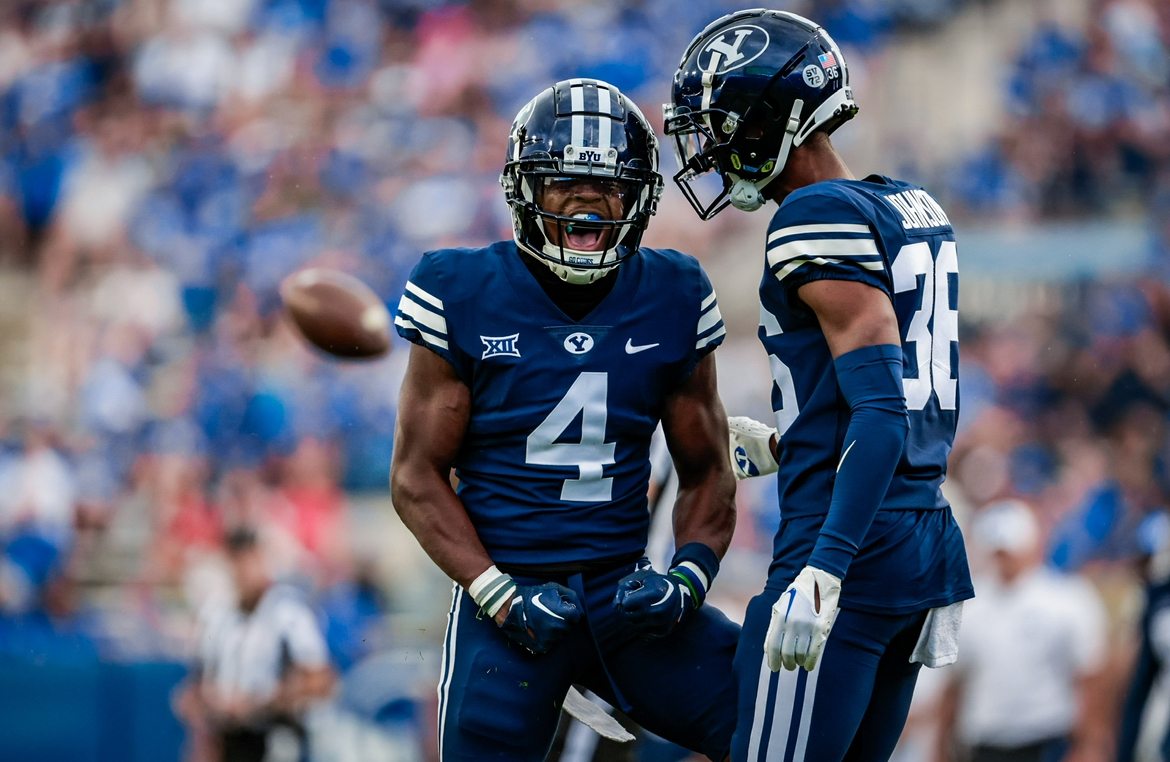
Football impacts everybody differently. No two players will have the same experience. Regardless, the love for the game is something that resonates deeply inside all those who play it. The game of football is something that has been a part of my life since I was little. As my career comes to a close I would like to take this opportunity to say goodbye to the game I love.
Dear Football,
When you came into my life, I wasn’t sure about you. I was too little to understand the beauty that lived inside of you. I had aspirations to be a rancher, a cowboy, not somebody who ran around with a helmet and a ball.
Despite the disregard I had for you, you stayed in my life. It was impossible to escape you. My family was too invested. Grandpa played college ball back in the day, that was enough to set everybody’s hair on fire each football season. Still, I remained unimpressed.
I was in first grade when my older brother played his first season. This is where my love for the game began to blossom. Watching fourth- graders, giants to someone of my stature, play this gladiator sport would bring tears to my eyes.
Saturday became the best day of the week, not for a lack of school, but for the opportunity to travel across northern Utah to watch my brother and his teammates create art on their canvas of grass. When they won, I cried, when they lost, I cried. I had been consumed, and I loved it.
The following year I was old enough to play in the “mighty mite” league of our youth division, and the greatest year of my life was about to start. Or so I thought. My own team was not as glorious as that of my brothers. We did not win games, I played offensive line despite being one of the smallest, but fastest kids, and I was angry.
I hated you. How could something so beautiful in someone else’s arms be so ugly in mine? I would fake sick to get out of practice, I would “forget” my pads, or helmet at home. When my parents went on a trip, I tried to convince my former collegiate athlete grandfather that my practice had been canceled. Not convinced, we drove to the practice field where surely enough practice was in session, and I was to attend.
When schedules would permit, I would wake up early to watch my brother play just to feel that love, to see that art in motion. Hours later I would go to play in my own game disappointed I could not produce the same caliber of work.
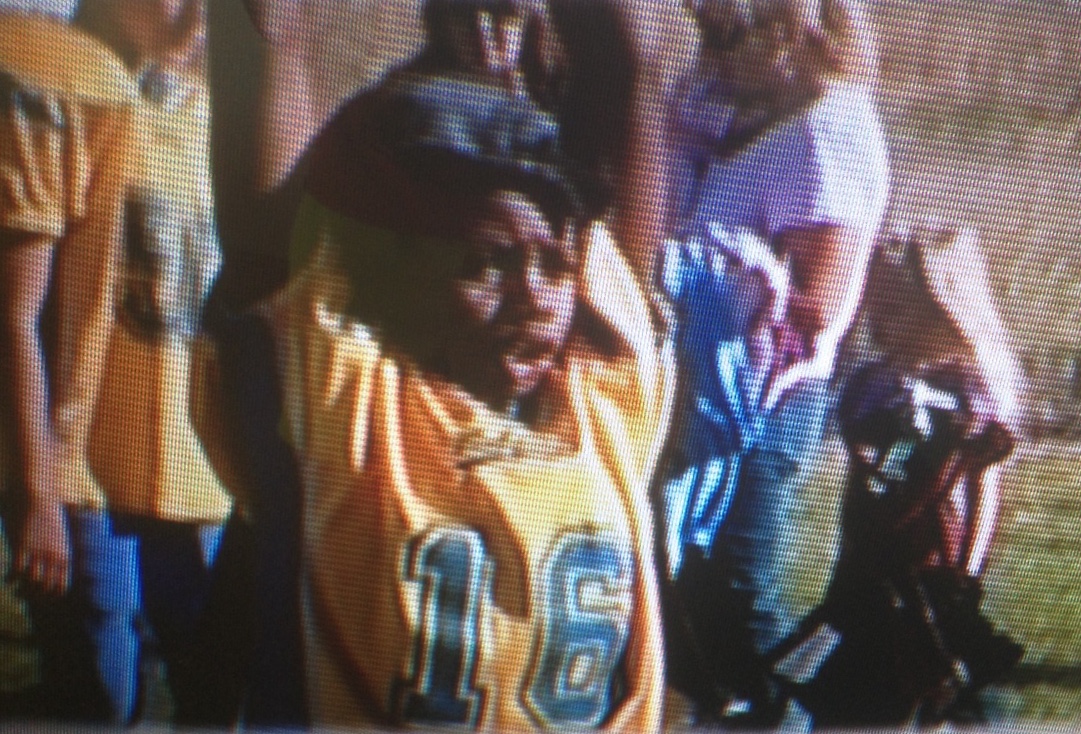
I wanted to quit. I wanted to return to the ranch life my toddler self had dreamed of having.
My parents, my mom specifically would not have let that happen. The game ran through her blood, she knew what it could do for me. The following season, I was put on a team that knew how to turn me into the player I was meant to be.
After that, the game was something I couldn’t live without. The older I got, the more I understood the game, and the more fun I had.
I would bite my tongue to keep myself from crying at every end-of-year banquet. How could I lose you for nine months? I would play other sports during the offseason, but none gave me the same gratification.
There was no greater gratification than receiving the scholarship offer to play college football for my grandfather’s alma mater, BYU. He was the first person I shared the news with, both of us tearing up over the phone. That small push he gave me years ago, to endure you when I hated you had gotten us to this moment.
Our relationship took its biggest toll over the last five years. The highs and lows of college football were something I wasn’t prepared for. For the first time in my life, I realized no matter how much love and dedication I poured into you, you could never guarantee me the same in return. I realized the game didn’t love everyone equally. Nevertheless, I fought for you, I fought to keep you in my life. At my lowest points, after losing starting spots, and having my scholarship taken away, I still loved you.
I am so thankful for the lessons you have taught me. I’ve learned to be strong, resilient, and patient, and to be part of a team. I’ve learned how to be at the top of the totem pole, and be a leader. I’ve learned how to be at the very bottom, and be a role player fighting for scraps on the scout-team practice squad. You taught me to never give up.
I’m grateful for the relationships you have given me. My best friends have all been teammates throughout my career. The network of people that have been put in my life because of you, has given me resources and tools I wouldn’t have otherwise.
I am eternally grateful for the memories. Driving state-to-state with my mom, and going to camps to display my talents. Playing with my brothers in front of crowds of 2,000 and 100,000. Twenty minutes bus rides to rival schools, and four-hour plane rides across the country.
My favorite memory will always be hugging my grandpa in the stands as tens of thousands rushed the field after we beat Utah in 2021. We hugged, we cried, and through all the noise he kept saying “Caleb, we did it!” This would be his last game in LaVell Edwards Stadium.
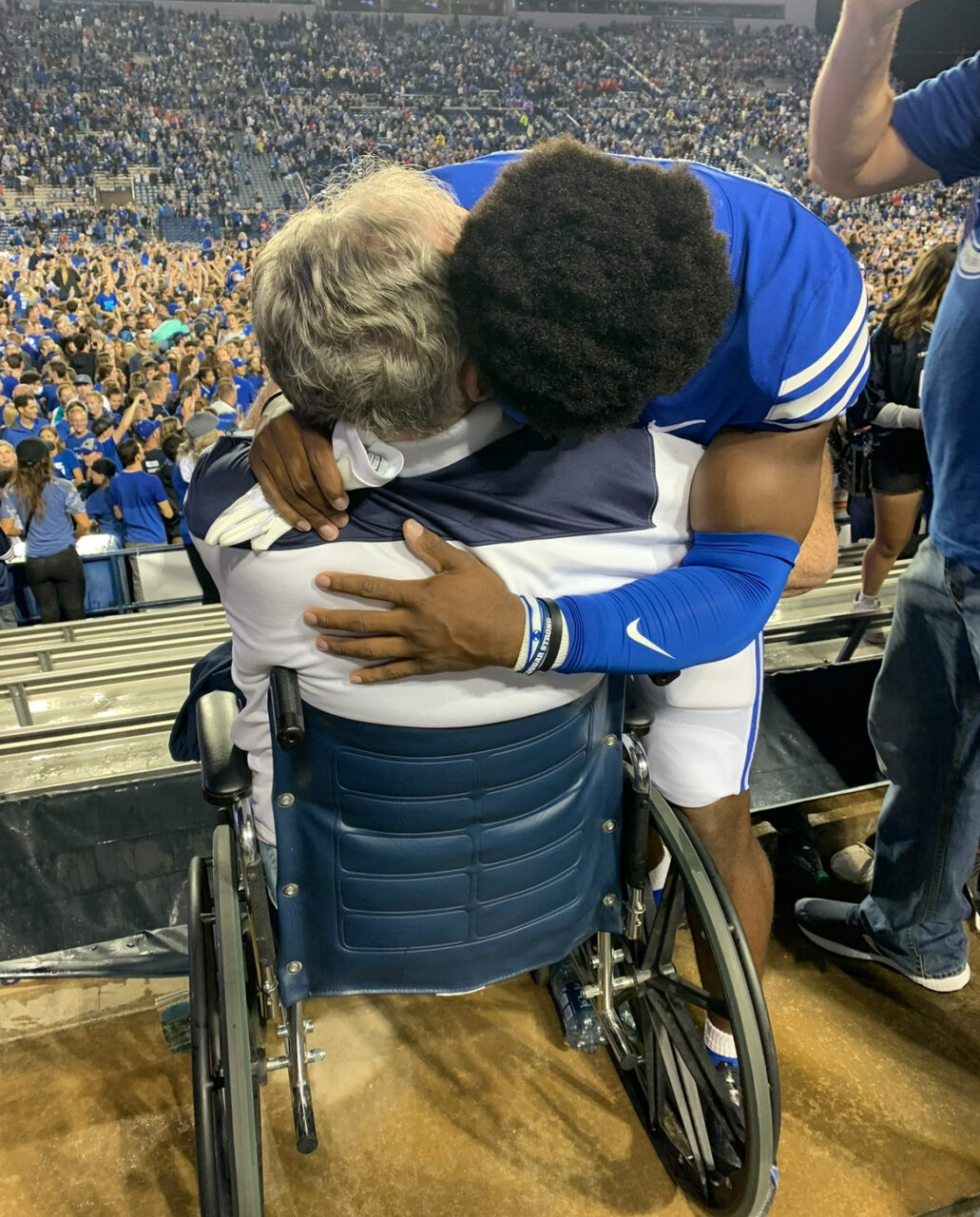
As my career comes to an end I am filled with gratitude. We’ve been together for 14 consecutive years. There are things I wish I could have done differently, but I wouldn’t trade my time with you for anything.
Thank You Football,
Caleb Christensen
52 16 21 31 9 15 4

